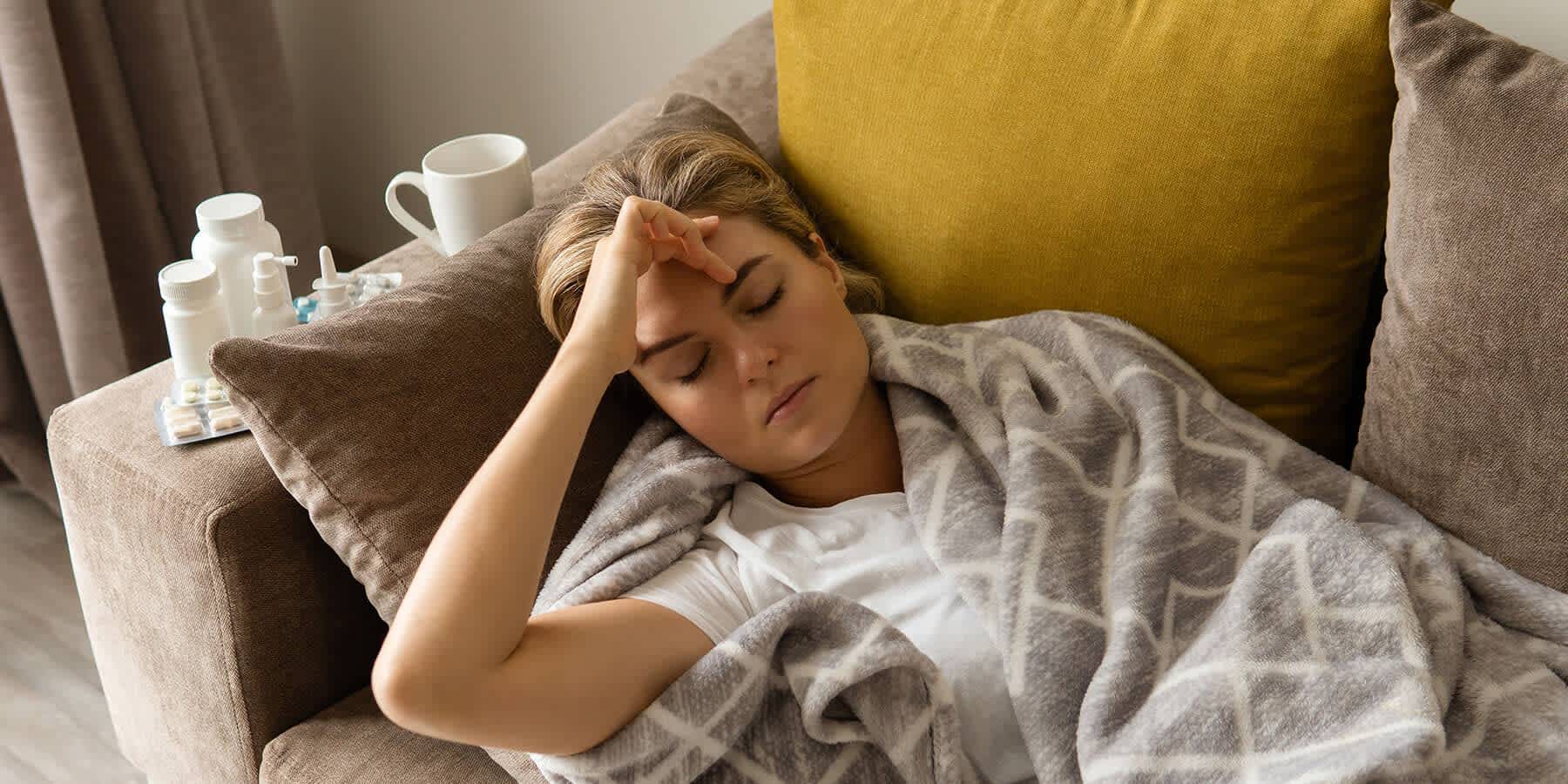
Coronasomnia: Tips for Sleeping Better with Anxiety-Induced Insomnia
So much has changed since the beginning of the COVID-19 pandemic, and for many people, this includes their sleep behaviors. Stress and anxiety caused by the pandemic have taken a toll on some people’s quality of sleep. This phenomenon, coined by some as “coronasomnia,” is linked to the COVID-19 pandemic.
Poor sleep is hardly new, with about 30% of adults experiencing insomnia, or difficulty sleeping at night. However, issues related to COVID-19 have exacerbated feelings of restlessness at night, nighttime anxiety, and other sleep issues. What’s more, disruptions to your body’s regular 24-hour sleep-wake clock (circadian rhythm) can affect immune function, potentially putting your health at greater risk during the pandemic.
So if you’re having trouble sleeping through the pandemic, read on to discover tips for sleeping better with anxiety.
What is “Coronasomnia”?
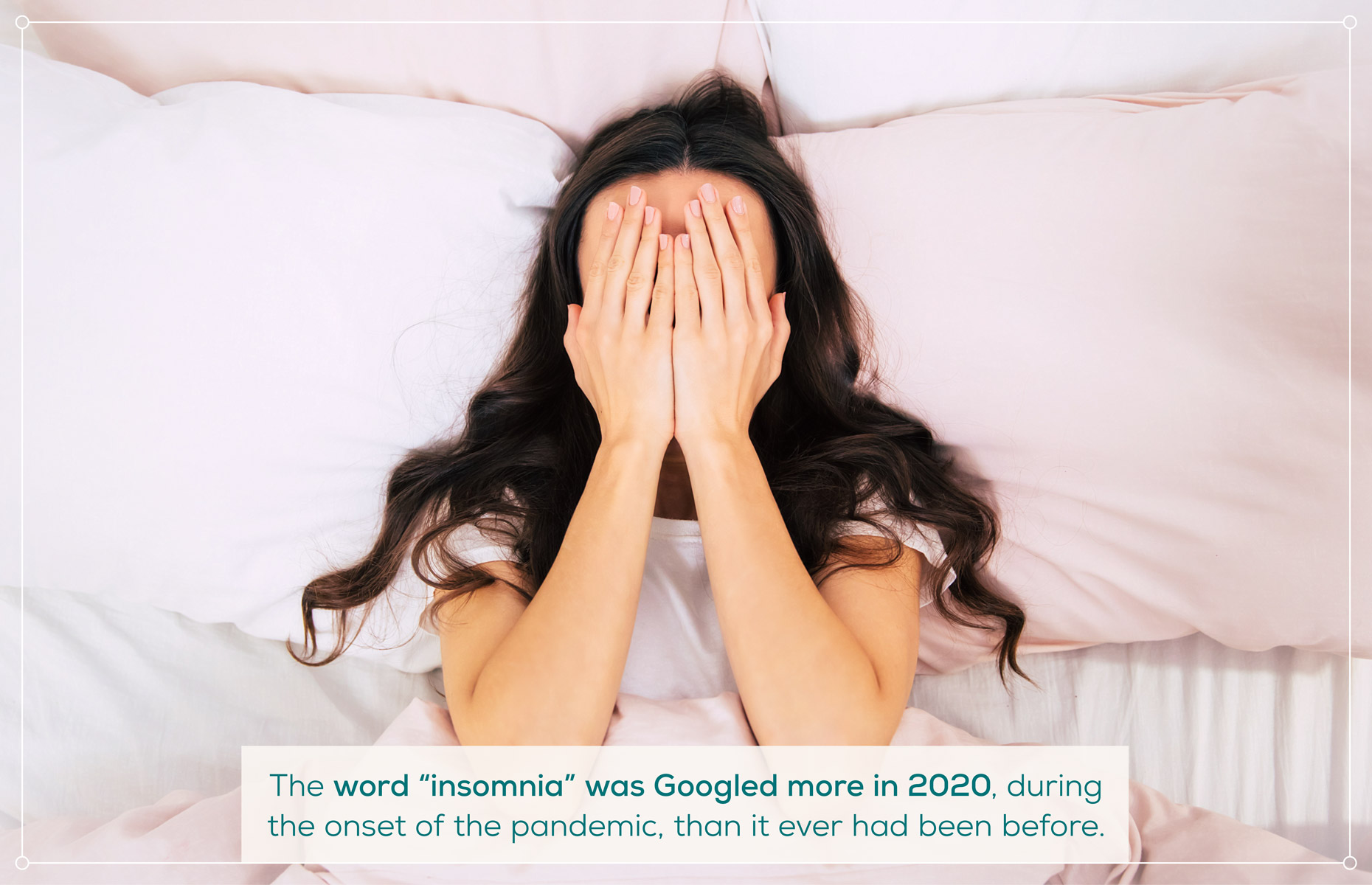 The term “coronasomnia” can be used to describe difficulty falling asleep, or staying asleep, due to COVID-19-related stressors or worries. From health and social concerns to economic/job instability, there are plenty of reasons for people to feel unsettled at night. Facing uncertainty often brings on anxiousness and can leave your mind racing, preventing you from falling asleep.
The term “coronasomnia” can be used to describe difficulty falling asleep, or staying asleep, due to COVID-19-related stressors or worries. From health and social concerns to economic/job instability, there are plenty of reasons for people to feel unsettled at night. Facing uncertainty often brings on anxiousness and can leave your mind racing, preventing you from falling asleep.
If you’ve found yourself worrying about what lies ahead, you’re not alone. A recent poll conducted by the American Psychiatric Association (APA) found that nearly half of Americans (48%) are anxious about the possibility of getting COVID-19, and 62% of Americans are anxious about the possibility of a family member or loved one getting COVID-19.
Whether your insomnia or difficulty sleeping is caused by the pandemic or not, it’s important to get to the bottom of your sleeplessness. Lack of sleep and disruptions to your body’s sleep-wake rhythm can increase the risk of certain long-term health problems such as obesity, cardiovascular disease, and diabetes.
How Anxiety Affects Sleep
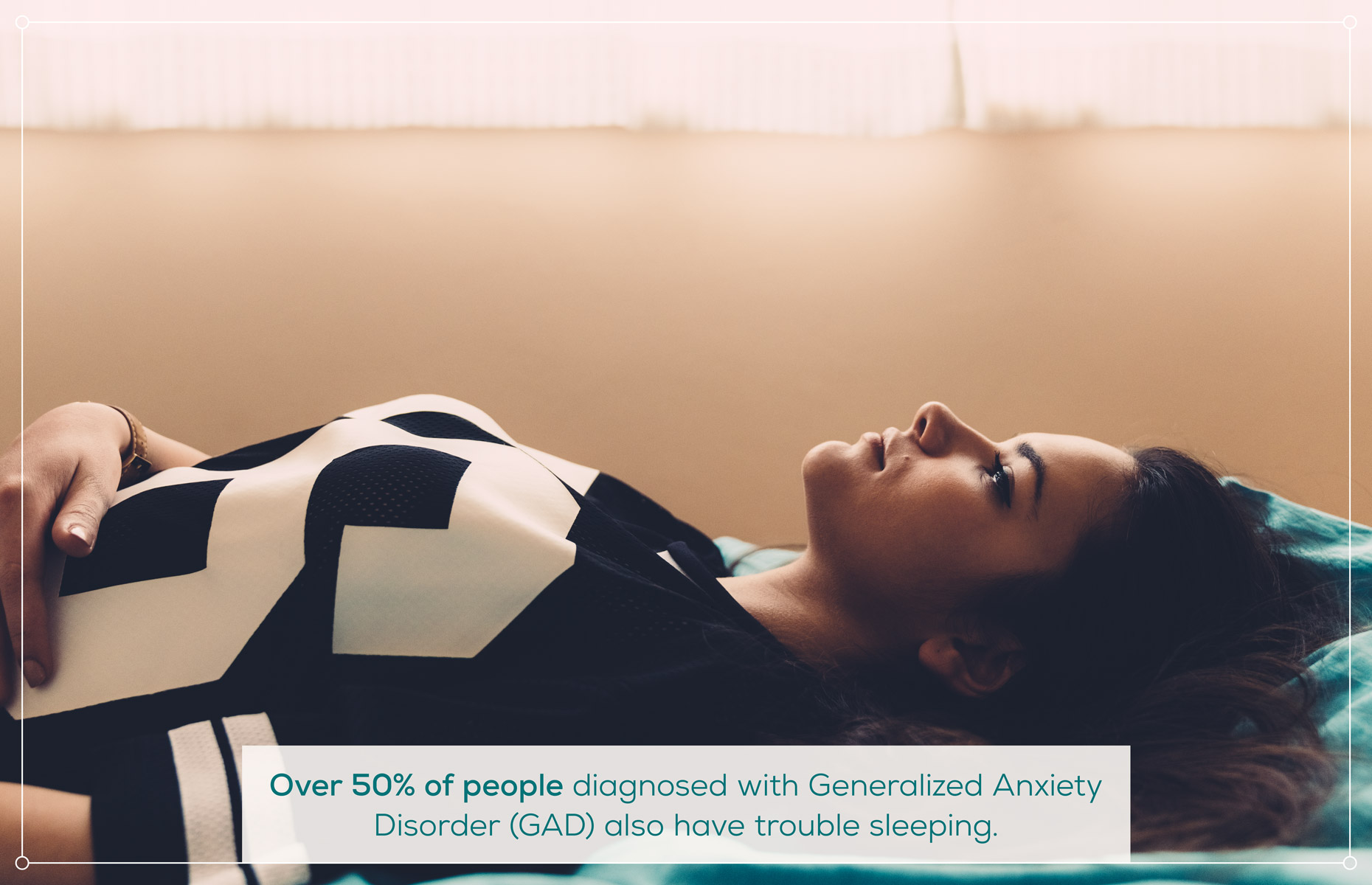 If sleep and anxiety were to label their relationship, let’s just say they’d call it complicated. When it comes to sleep issues and anxiety, it can be difficult to uncover which came first. Research shows that anxiety can lead to sleep problems, and lack of sleep can lead to anxiety—creating a vicious, and sleepless, cycle.
If sleep and anxiety were to label their relationship, let’s just say they’d call it complicated. When it comes to sleep issues and anxiety, it can be difficult to uncover which came first. Research shows that anxiety can lead to sleep problems, and lack of sleep can lead to anxiety—creating a vicious, and sleepless, cycle.
What we do know is that if you have generalized anxiety disorder (GAD), your chances of experiencing sleeplessness increase. In fact, sleep disorders are found in over 50% of patients with generalized anxiety disorder.
7 Ways to Help Calm Your Mind at Night
If you’re suffering from feelings of anxiety about the pandemic and are having a difficult time sleeping, committing yourself to improving your sleep habits is the first step. Below we’ve listed seven natural ways to help calm your mind and body to help you drift into a peaceful sleep amidst the pandemic.
1. Set the Mood
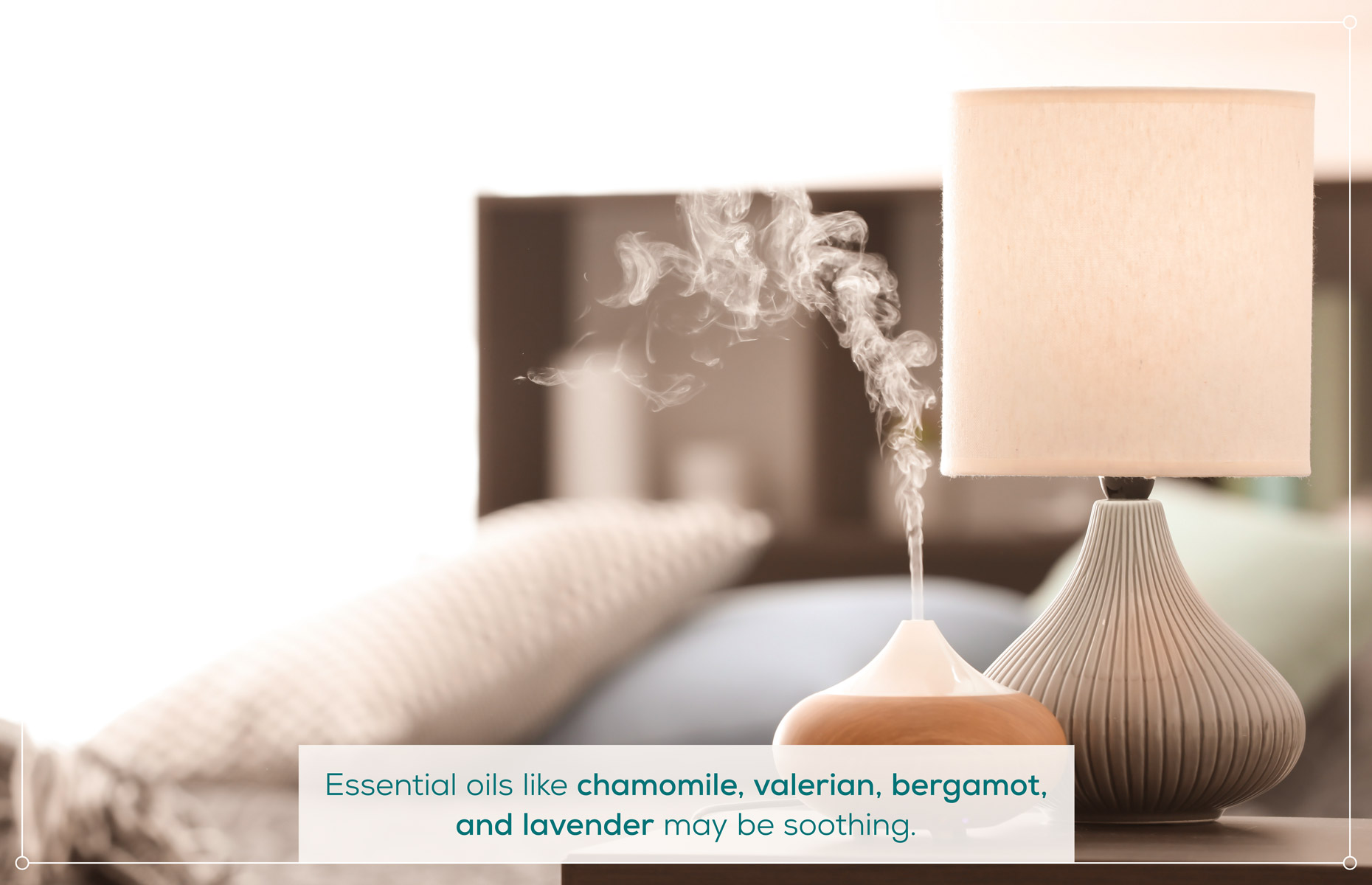 When it’s time to unwind for bed each night, try creating a nightly routine designed to calm your space, body, and mind. This could be controlling the light, temperature, and sound in your home to help you unwind and get a good night’s sleep. You could also promote a relaxing and calming mood with aromatherapy.
When it’s time to unwind for bed each night, try creating a nightly routine designed to calm your space, body, and mind. This could be controlling the light, temperature, and sound in your home to help you unwind and get a good night’s sleep. You could also promote a relaxing and calming mood with aromatherapy.
Aromatherapy, or the therapeutic use of essential oils, works by stimulating the smell receptors in the nose, which then send relaxing messages through the nervous system to the limbic system (the part of your brain that controls emotions). Many people report positive sleep outcomes when using essential oils as directed. However, it’s important to note that essential oils aren't regulated by the Food and Drug Administration (FDA) for quality or safety—so be sure to do your research on whatever essential oils you’re planning to use.
2. Take a Warm Bath
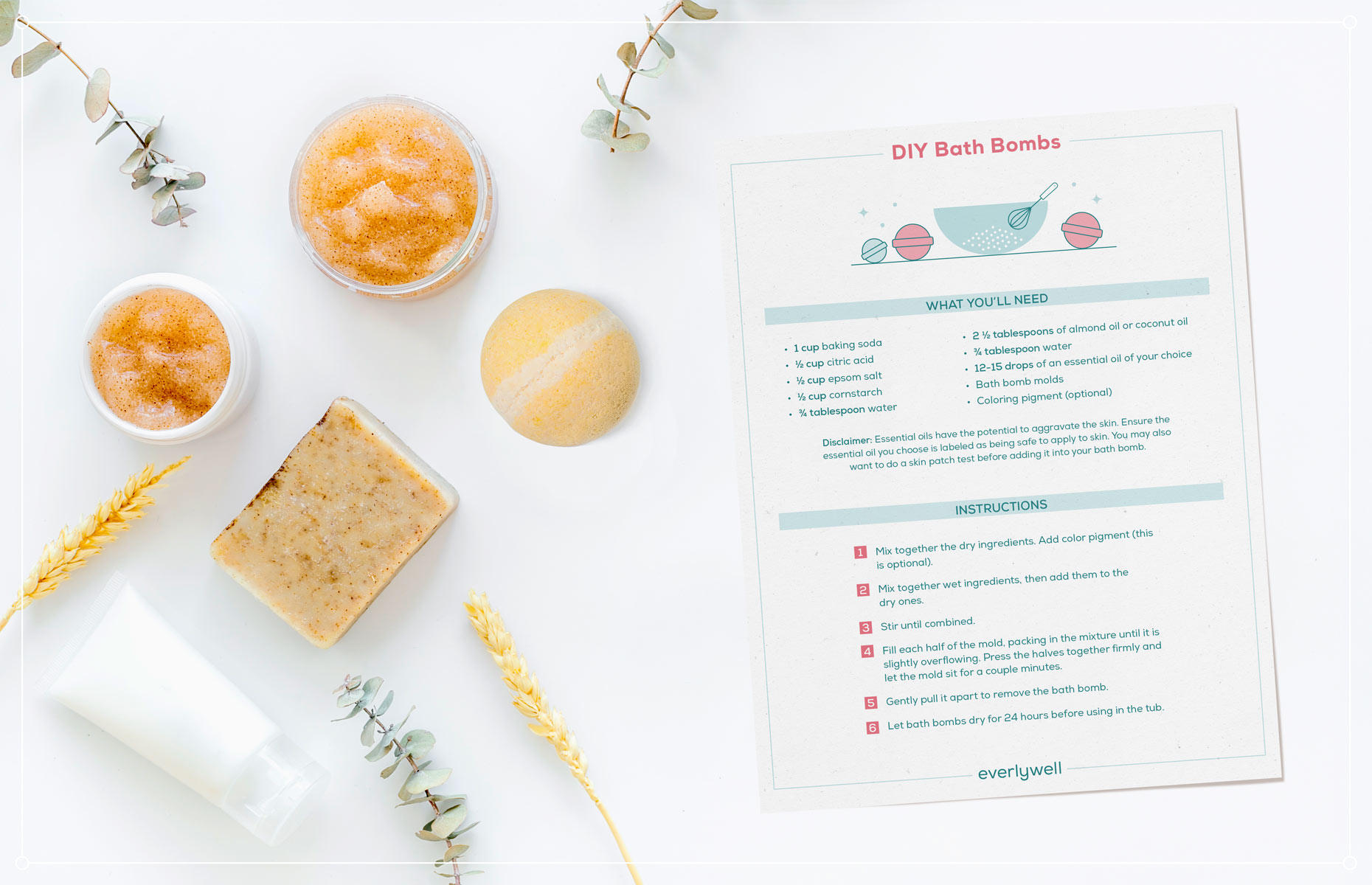 If you are having a hard time falling asleep at night, taking a warm bath shortly before bed may help. This can help lower your body temperature, allowing you to fall asleep more quickly. Taking a warm bath could also help boost your mood and promote relaxation after a long or even stressful day.
If you are having a hard time falling asleep at night, taking a warm bath shortly before bed may help. This can help lower your body temperature, allowing you to fall asleep more quickly. Taking a warm bath could also help boost your mood and promote relaxation after a long or even stressful day.
You can also incorporate candles, a DIY bath bomb, or soothing music to elevate your bath time and promote feelings of peacefulness.
3. Exercise
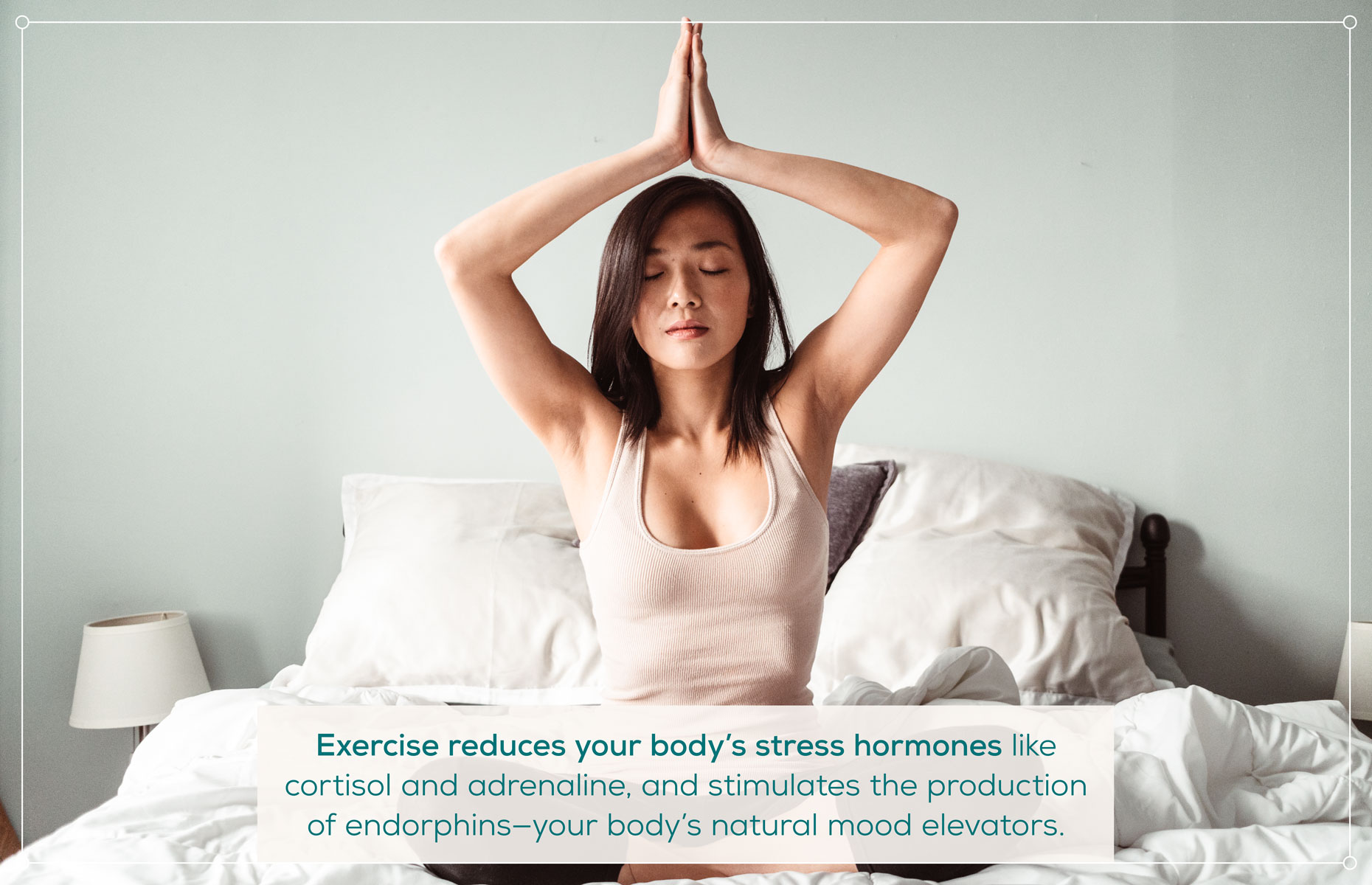 When you are stressed or anxious, your stress hormones stimulate your sympathetic nervous system, or your “fight or flight” response. So, when you’re stressed at night, your body isn’t ready to rest—instead, it’s ready to respond to your triggers. Exercising can be an effective way to regulate your stress hormones, such as adrenaline and cortisol.
When you are stressed or anxious, your stress hormones stimulate your sympathetic nervous system, or your “fight or flight” response. So, when you’re stressed at night, your body isn’t ready to rest—instead, it’s ready to respond to your triggers. Exercising can be an effective way to regulate your stress hormones, such as adrenaline and cortisol.
It is known that exercise can help tire out your body and mind so you can sleep better at night. One recent study found insufficient physical activity due to the COVID-19 pandemic was associated with negative changes in sleep quality. Bedtime yoga is also a good way to get your body moving and ease your mind before bed. There are even certain poses that are designed to help promote sleep.
The effects of exercising impact people differently, so if you find that moving your body in the evening energizes you rather than makes you tired, try doing it earlier in the day.
4. Read in Bed
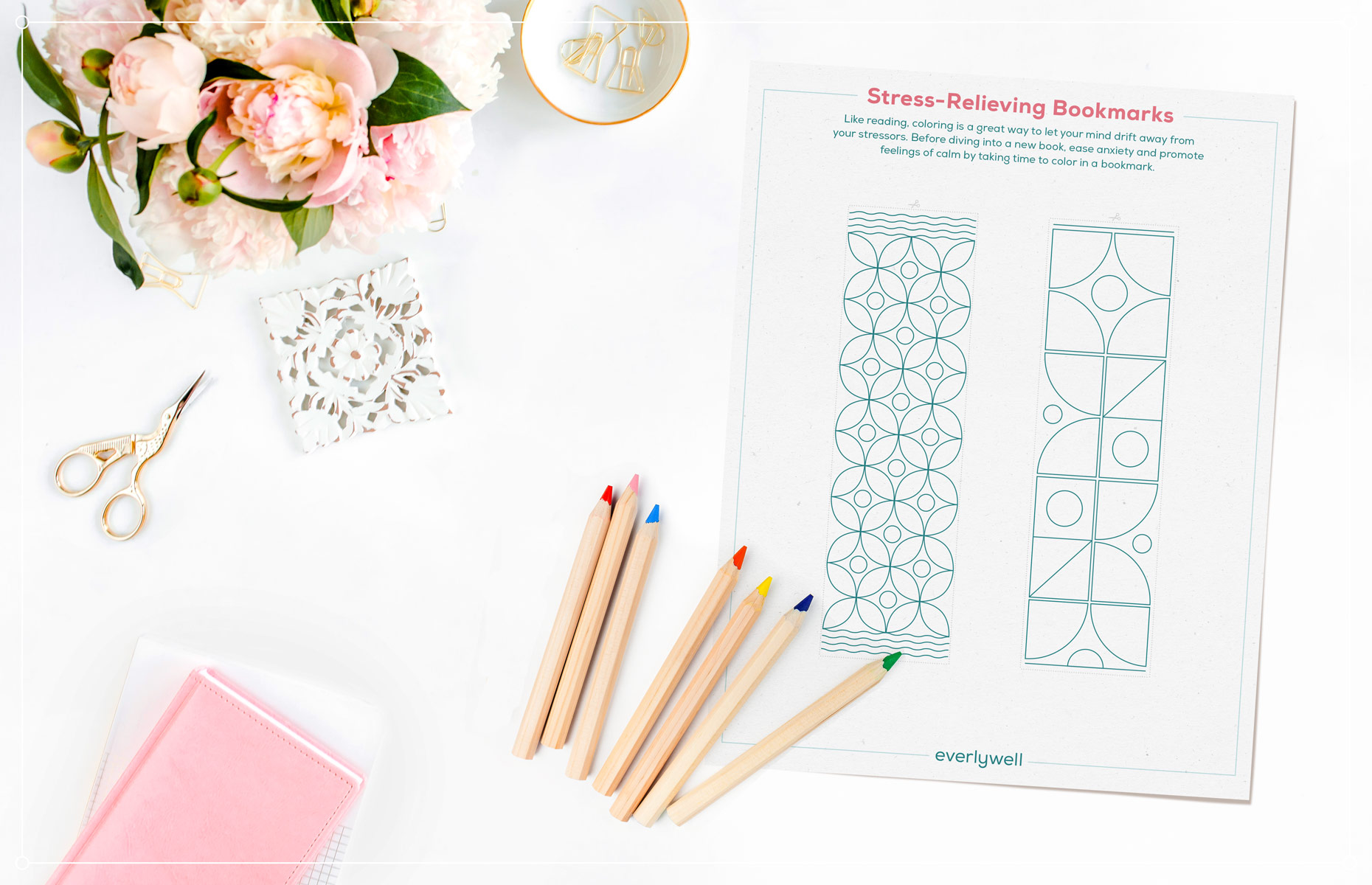 Your phone, tablet, and TV emit light that can throw off the body’s biological sleep clock and disrupt your ability to sleep well. It is recommended to try to limit blue light exposure an hour before bedtime. So instead of binging the newest show or scrolling through social media in bed, consider giving your brain a break and read a book.
Your phone, tablet, and TV emit light that can throw off the body’s biological sleep clock and disrupt your ability to sleep well. It is recommended to try to limit blue light exposure an hour before bedtime. So instead of binging the newest show or scrolling through social media in bed, consider giving your brain a break and read a book.
Reading before bed is a great way to help you relax and ease your mind when you have feelings of anxiousness.
5. Avoid Caffeine and Alcohol Before Bed
 Not only can stimulants worsen feelings of anxiety, but they can also have a negative effect on your sleep. If you drink caffeine to get through the day, avoid having it in the afternoon or evening, as research has shown that caffeine interferes with the circadian rhythm, delaying the onset of sleep when it is consumed late in the day.
Not only can stimulants worsen feelings of anxiety, but they can also have a negative effect on your sleep. If you drink caffeine to get through the day, avoid having it in the afternoon or evening, as research has shown that caffeine interferes with the circadian rhythm, delaying the onset of sleep when it is consumed late in the day.
Alcohol may be known to make you feel sleepy, but consuming alcohol in excess prior to bedtime has been linked to poor sleep quality and duration. It is thought that alcohol affects your ability to have a good night’s sleep by reducing your REM sleep, causing sleep disruptions. People who drink alcohol before bed often experience insomnia symptoms and feel excessively sleepy the following day.
6. Calm Your Mind
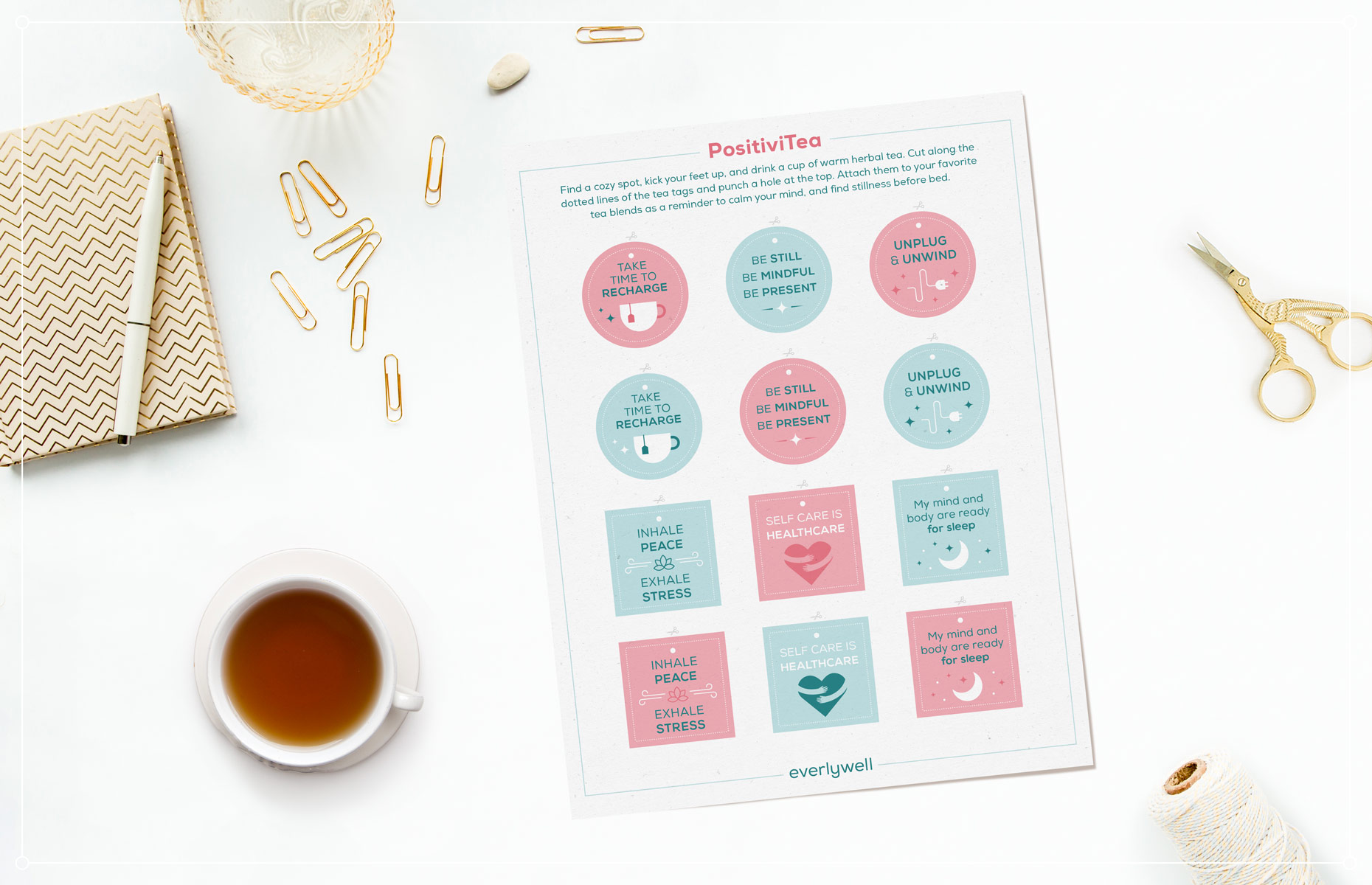 There are many relaxation techniques that can help you calm your mind throughout the day and improve sleep. Shortly before bedtime, try a relaxation strategy that incorporates mindfulness, yoga, deep breathing, or meditation, all of which can boost sleep time and quality.
There are many relaxation techniques that can help you calm your mind throughout the day and improve sleep. Shortly before bedtime, try a relaxation strategy that incorporates mindfulness, yoga, deep breathing, or meditation, all of which can boost sleep time and quality.
Just ten minutes of stillness or mindfulness can clear your mind and help you find a sense of calm. Studies have shown that meditation can reduce stress, anxiety, pain, and enhance self-awareness.
Calming your mind during the day can be as simple as taking a long walk when you have a break at work. If you practice techniques for calming your mind during the day, then it will be easier for you to ease into a relaxed state of mind at night.
7. Write Down Your Thoughts
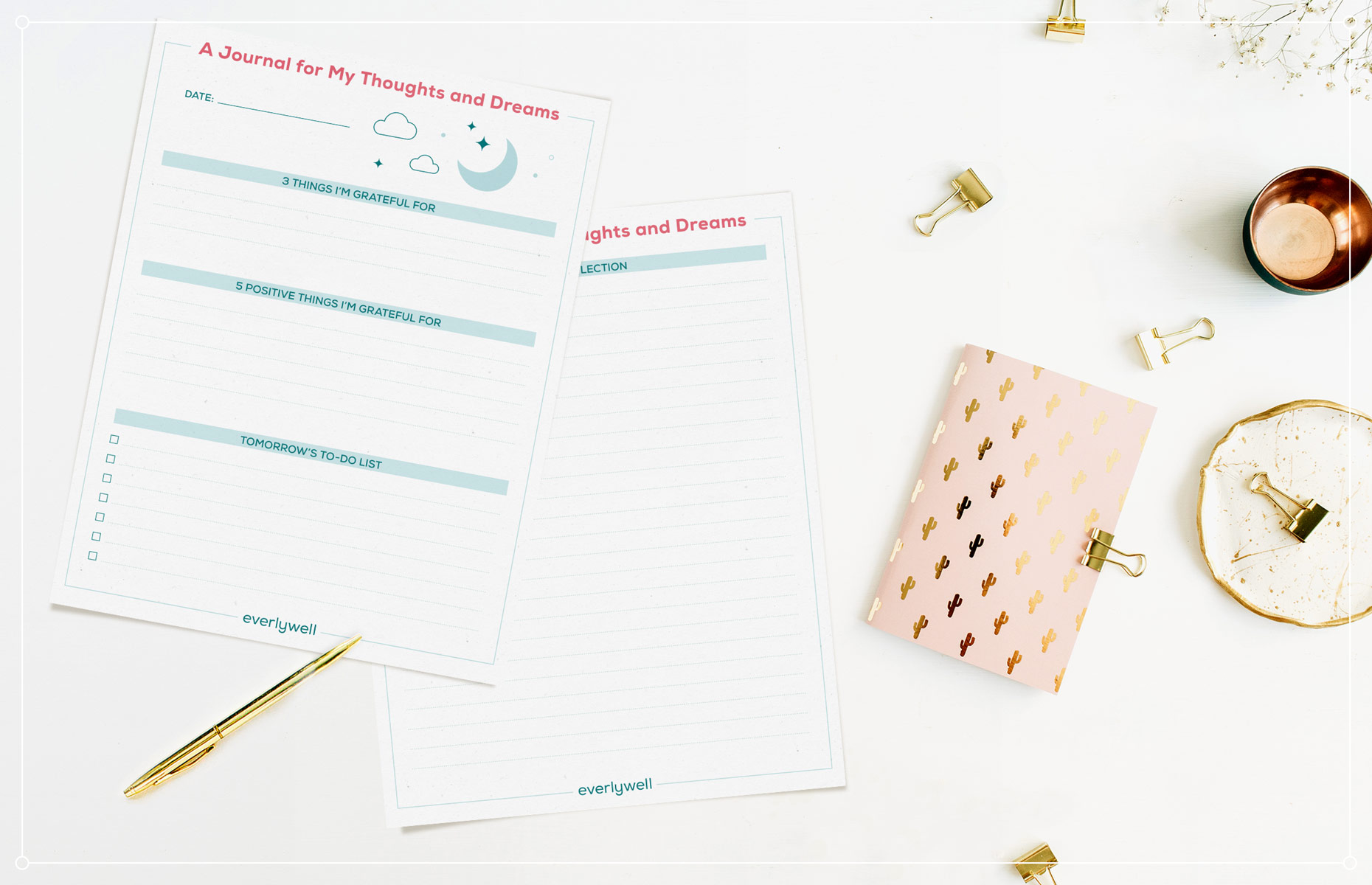 If your mind is running rampant at night and unable to unwind, consider moving your thoughts from your mind to paper. A recent study suggests that journaling for just five minutes before bed can help a restless mind transition to sleep.
If your mind is running rampant at night and unable to unwind, consider moving your thoughts from your mind to paper. A recent study suggests that journaling for just five minutes before bed can help a restless mind transition to sleep.
If one of your anxiety triggers involves worrying about your daily activities, you may notice your anxiety spikes more at night. Creating a to-do list for the day or week ahead may help take away some of that anxiety.
If you’re dealing with a case of “coronasomnia,” know that you’re not alone. These unprecedented times are stressful, and it’s okay to let yourself feel, and for your emotions to respond to the current times. What’s important is being able to ground yourself in the here and now, and bring your mind and attention back to a relaxed state at the end of each day.
If you suspect you have a sleep disorder or are suffering from chronic stress or anxiety, it is recommended to consult your primary care provider, who may refer you to a sleep specialist.
Experiencing COVID-19 symptoms and looking for relief? Get COVID-19 treatment online via Everlywell's Virtual Care offering.
Sources: American Academy of Sleep Medicine | US National Library of Medicine| Cleveland Clinic | American Psychiatric Association | US National Library of Medicine | Sleep Foundation | Mayo Clinic | Sleep Foundation | Harvard Health Publishing | US National Library of Medicine | Harvard Health Publishing | Sleep Foundation| Sleep Foundation | National Library of Medicine | National Library of Medicine
